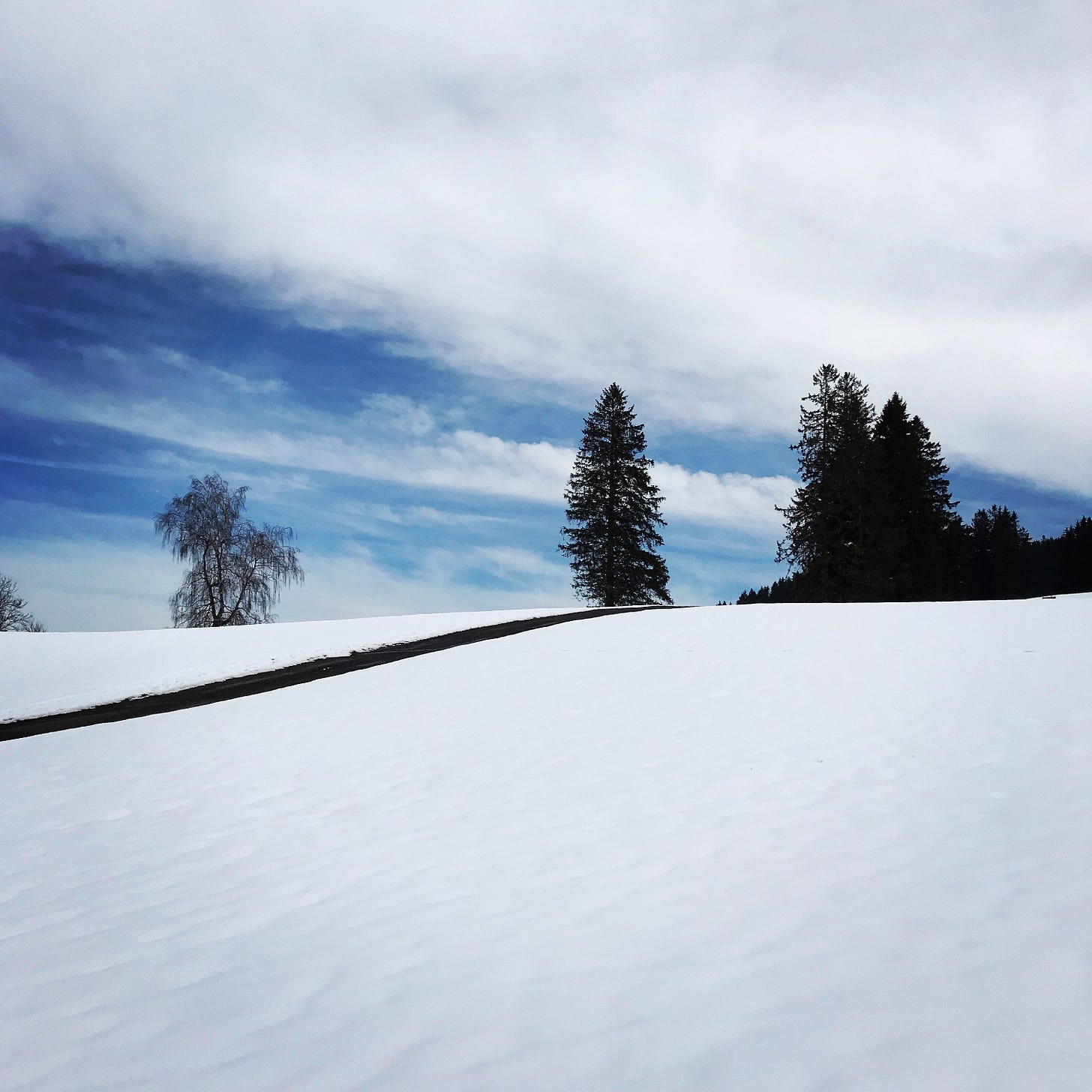# 36 Uplifting Takeaways from 6 Years of Nomad Life
On change, mindfulness, uncertainties, and kindness
When our landlady told us she was going to sell her house in Paris, Daniel and I grieved. We’d been so happy there. We’d become who we were under its badly insulated roof, and had given birth to songs, novels, and scripts between its century-old walls.
But soon after we left Paris, our grieving ended: We thoroughly enjoyed our life without a fixed home, slow-traveling from one country to the next.
We’d planned to be nomads only “for a while” to figure out what we wanted to do with the second half of our lives. Six years later, we’re still wandering. A while is a time that keeps stretching.
Are we not restless? Not tired of saying goodbye, carrying our bags, feeling lost in yet another town?
There are plenty of downsides to being a nomad—a subject for another essay—but for us they don’t outweigh the benefits. What I appreciate most about the past 6 years is how it has transformed my thinking and given me new ideas about the world.
In April 2018, I wrote on my travel blog:
“It is my challenge to overcome my anxieties and open up, stop fearing the unknown future and embrace the time ahead as a source of possibilities. I’m hoping that traveling will allow me to change. If anything, it’s time I learn to appreciate the present.”
Today, I’d like to share what nomad life has taught me, hoping these ideas might spark debate.
Uplifting Takeaways from 6 Years of Nomad Life
1. Youth is Not a Requirement for Change
We were set in our ways when we left Paris. We relied on ergonomically-designed chairs and a washing machine that worked. We thought we couldn’t survive without DEET-free repellents and soy milk in our coffee. But the farther we traveled, the less we needed.
Little by little, we shed our comforts and habits, our designer clothes. We adapted to whatever situation we happened to find ourselves in and became less finicky about the foods we ate, the beds we slept on. Part of this was psychological, willed: I wanted to travel to rural areas in Southeast Asia, so I had to accept the inevitable spiders in my room. Another part was physical, practiced: We learned to sleep in narrow beds, shower with cold water, and do our morning yoga without a mat.
What we still have serious trouble with is sound pollution: construction noise, barking dogs, disco music, muezzins, roosters, traffic, shrieking kids, karaoke, drunk tourists. Except for in Japan, the world is loud! Even in what are supposed to be sleepy mountain villages, we can have trouble concentrating. Noise-cancelling headphones help yet not enough. Overall, though, I’m amazed at how much we’ve changed.
2. Everyday Life is Not Boring
For the longest time, I disliked going grocery shopping and preparing meals. Such domestic activities were essential yet tedious to me, so I did them on automatic pilot with my mind elsewhere. Abroad, I took a cultural interest in almost all domestic work, including sweeping floors and doing laundry. Defamiliarized, such activities became opportunities to learn something about the country I was in. I paid more attention to what I was doing and why, noticed more details, and sensed how my curiosity grew. Even when we returned for intervals to the Netherlands, France, and the United States—places we knew well and called “home”—this curiosity stayed with me. Grocery shopping is always an opportunity to look at the world and the people in it. There is value in the mundane if we are sufficiently present and pay it the attention it deserves.
3. Having No Fixed Home Doesn’t Mean You’re Homeless
I’ve never felt more welcome with friends and family than after Daniel and I lost our home. We often stayed longer than before and spent more time together with others. I still worry sometimes that we overstay our welcome and become a nuisance, but I’m getting better at trusting what people tell me. If they literally say it’s okay to stay for a certain period, I should be able to accept their hospitality without guilt.
We’ve also become very good at making a home for ourselves in the houses we temporarily inhabit. Within a day, our meager possessions have found their place on tables and shelves, and we’ve fallen into a pattern: breakfast on the terrace, a stroll through graffiti art at dusk, and finding the best food stalls for dinner—our current regime in Cartagena, Colombia.
Communities are surprisingly flexible, too. We can come and go with years of absence in between and still feel part of a bigger whole. I must admit, however, that local connections would surely be stronger if we moved around less. My true tribe is decentralized, spread across the globe.
For more about this subject, you may want to read How to Feel at Home in a Foreign Country.

4. Most People Are Helpful (and Surprisingly Similar)
This might not be a popular opinion considering the world’s malaise. Wars are being fought, greed rules, injustice thrives, looters abound, and intolerance for anyone and anything unlike us is growing. Doomscrolling the news makes us believe we’re all selfish monsters (because negativity boosts clicks). History, too, shows us that fear and indoctrination can destroy the moral compass in almost anyone. So how can most people be helpful?
First, we must make a distinction between individuals and governments, between tribes tied together by care and groups motivated by political ideas, between crime driven by cruelty and transgressions triggered by need.
Our systems more than our nature are to blame for the malaise. We do have selfish genes that want to perpetuate themselves, but these genes don’t necessarily make selfish individuals. Science shows that we’ve evolved in groups in which collaborative behavior and kindness were rewarded.
Daniel and I sure met a few swindlers in the past 6 years and always stayed on the alert for crime, yet the vast majority of individuals we met were curious, kind, helpful, and socially intelligent. Even profiteers smile when their kid is on the phone or when you humor them, forcing them into a human instead of a transactional interaction. In the end, we all want the same things in life no matter where we were born: love, security, validation, respect, health, happiness.
My experiences are very limited and privileged, of course, but they’re based on real day-to-day contact with individuals, plenty of whom outside the tourism trade. We often stayed in places for several months and became part of the community when calamities happened, such as the pandemic, a typhoon, or a death, moments when people look one another in the eye and show their face.
Traveling has made me more optimistic about our human nature. We have an intense, inherent interest in one another, despite our differences, and we want to belong to a group. I draw comfort from the belief that what we have in common with others is far greater than what separates us.
For who wants to know more about this subject, I recommend the book Humankind: A Hopeful History by Rutger Bregman (Little Brown, 2021)
5. Living May Be More Important than Writing
This is a tough one for me. I identify with being an author. Becoming my best self means investing time in honing my craft. Excellence comes with practice, the butt-in-the-chair kind of thing, and our nomadic lifestyle has drastically reduced the hours I spend at a desk. But it hasn’t reduced my happiness. It feels tremendously good to grasp a story line and see all the elements come together, ideas rushing at me from all sides, connecting with one another. It makes me feel important and alive, in touch with a world that is otherwise untouchable. But if I’d stayed in Paris my whole life, I would have missed out on so many experiences that feel equally magical, experiences that connect me to a less solitary and more material world. I’m not convinced yet that swimming with sea lions or picking coffee cherries will make me a better person. But I do know they make me a different person, a person that often says with gratitude, “This is a wonderful life, and I’m living it.” Writing is still my most trusted way to navigate the distance between myself and the world, and when I don’t write enough, I feel disconnected. But I’m slowly learning that I can also just be and experience life in real time.

6. Losing Certainties is a Gain
We carry many unconscious beliefs about the world. We pick up snippets of information from the people we talk to and the books we read and fill in the blanks with our imagination. When we travel to new places, and especially to cultures different from our own, these beliefs get challenged by the reality we encounter. Things are rarely as we had expected them to be and this can be unsettling. Traveling turns our world upside down, much like arial yoga does. It forces us to reconfigure the world from a new, better informed perspective. At first this made me feel deceived or ignorant. How could I have been so wrong? But the more I travel, the more I welcome these reconfigurations. Not to store other certainties, but to replace my previous beliefs with questions. By losing what I thought I knew I feel closer to a world I can never fully comprehend.
Am I being too positive? Too optimistic? Feel free to object in the comments below. But please know, I’m working on the sequel of this post, Less than Jubilant Takeaways from 6 Years of Nomad Life. Because, you know, nothing beautiful exists without a shadow.
Author News
My flash fiction collection “Woman of the Hour: Fifty Tales of Longing and Rebellion” is in its last editing stages. I’ll have to proofread the final draft soon and will probably be able to show you the cover design this month. I received some beautiful, generous blurbs from masters of the genre I strongly admire and simply cannot wait to share this book with you all!
Do you want to receive a review copy, invite me on your podcast, interview me, or get involved in some other way? Please reach out. The book is released in late July 2025.
Related Posts
If you enjoyed this post, you might also be interested in reading:
Time to Say Goodbye
After a month in Colombia, chasing hummingbirds and parrots, Daniel and I are moving to Mexico, where we will care for Dulce, a cat in San Miguel d’Allende whose human is a reader of this newsletter. If any of you are ever in need of a house or pet sitter, please think of us. We might be just the right couple.
All my best,
Claire
P.S. Your questions about nomad life are always welcome.









This was a very inspiring read! Having lived in Colombia on-and-off for a couple years, I can relate to when you see you don't need as much as you think to be happy. People I meet here embrace simple pleasures like going to the store or simply sitting and watching cars go by. I was always used to so much stimulation and needing "newness" but being here has been a revelation. Thanks for sharing this list!
This is a sensational letter to the world and to us. Thank you for it.